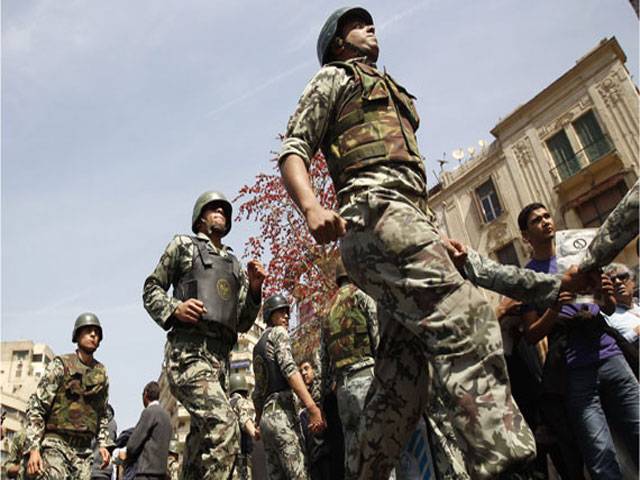CAIRO (AFP) - Egypt’s powerful military put its foot down on Saturday in the crisis dividing the nation by demanding the Islamist-led government and political foes start dialogue and warning it would not permit events to take a “disastrous” turn.
But there was no immediate sign of compliance by either camp, whose two weeks of protests spilled over into bloody clashes in Cairo that killed seven people and wounded more than 600, prompting the army to deploy with troops and tanks.
“The path of dialogue is the best and only way to reach agreement and achieve the interests of the nation and its citizens,” said a statement from the armed forces - the first since street protests against President Mohamed Mursi erupted more than two weeks ago.
“The opposite of that will take us into a dark tunnel with disastrous results - and that is something we will not allow.”
The stark ultimatum underlined the gravity of the crisis pitting Mursi and his Muslim Brotherhood backers against the largely secular opposition alarmed at the president’s expanded powers and efforts to push through a new constitution.
But Islamist parties, including the political wing of Mursi’s Muslim Brotherhood, rejected opposition demands to delay a referendum in a week’s time on a new constitution they helped draft.
The National Salvation Front opposition coalition insists that a postponement is a non-negotiable condition for any talks.
It also demands that Mursi give up expanded powers he assumed last month that put him beyond judicial review.
The colliding forces, hardened from so many days of confrontation and intransigence, have set Egypt - the Arab world’s most populous nation - on a potentially explosive path.
On Saturday afternoon, hundreds of anti-Mursi protesters were again starting to gather in front of the presidential palace for what have become nightly demonstrations.
One late on Friday gathered more than 10,000 people, who pulled aside army barbed-wire barricades and clambered atop tanks to call loudly for Mursi to step down before they peacefully dispersed hours later.
The military’s ultimatum for talks was a significant step.
The army has an influential role in Egypt’s political life, though it officially maintains a neutral stance.
After former president Hosni Mubarak was toppled in Egypt’s uprising in early 2011, the army ruled for more than a year, until Mursi’s election in June 2012.
The military underlined it “stands always with the great Egyptian people and insists on its unity” but also said it was its duty to protect state institutions.
It urged a solution based on “democratic rules.”
Mursi himself offered in a televised speech to the nation on Thursday to hold dialogue with the opposition, though his defiant tone suggested he was not in the mood for concessions.
But the National Salvation Front stuck to its guns over the question of his new powers and delaying the referendum, and the the response from the Islamist parties on Saturday was uncompromising.
They insisted that the referendum “take place on the scheduled date, with no modification or delay,” according to a joint statement read to media by the number two of the Muslim Brotherhood, Khairat al-Shater.
That backtracked from a trial balloon launched earlier by Vice President Mahmud Mekki, who had said Mursi “could accept to delay the referendum,” but only if the opposition guaranteed it would not exploit the legal breach triggered by pushing it back.
Barring concessions that neither side seems willing to make, the situation for Egypt looked likely to worsen, according to observers.
“There is no option for de-escalation,” said Eric Trager, an analyst with the Washington Institute for Near East Policy.
“The Muslim Brotherhood believes it has majority support so it can go ahead with the constitutional referendum. It thinks that it can win,” he said.
Wednesday, April 17, 2024
Egyptian army warns talks must resolve crisis

Pride and hype as F1 roars back to China after Covid absence
10:36 PM | April 16, 2024
No let-up in Karachi street crime incidents
10:35 PM | April 16, 2024
Stock market today: Most of Wall Street weakens again as Treasury yields rise more
10:34 PM | April 16, 2024
Muslim K-popstar Daud Kim buys land to build mosque in South Korea
10:33 PM | April 16, 2024
Punjab Stadium unavailability derails National Challenge Cup 2023 Final Round
10:28 PM | April 16, 2024
Political Reconciliation
April 16, 2024
Pricing Pressures
April 16, 2024
Western Hypocrisy
April 16, 2024
Policing Reforms
April 15, 2024
Storm Safety
April 15, 2024
Democratic harmony
April 16, 2024
Digital dilemma
April 16, 2024
Classroom crisis
April 16, 2024
Bridging gaps
April 16, 2024
Suicide awareness
April 15, 2024
ePaper - Nawaiwaqt
Advertisement
Nawaiwaqt Group | Copyright © 2024





